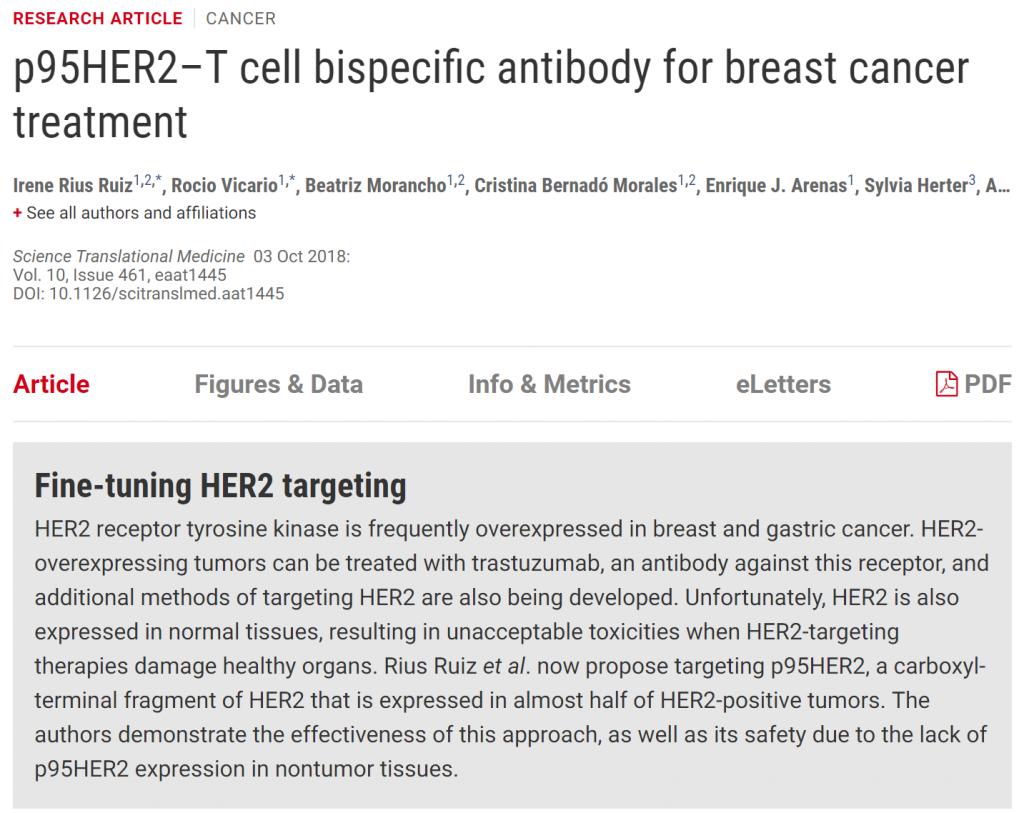Immunotherapy was positioned as an emerging and even promising treatment for cancer. Today’s new immunotherapeutic agents for different tumor types, whether used alone or in combination, are increasingly becoming one of the most innovative and powerful anti-cancer strategies. One of the main challenges in ensuring these new treatments achieve their true potential, is to successfully allow the immune system to attack only tumor cells while not attacking healthy tissues.
p95HER2-TCB
In a recent study, researchers from Spain regard this challenge as a therapeutic opportunity. They revealed that the p95HER2-T cell bispecific antibody (p95HER2-TCB) was able to successfully direct lymphocytes directly onto cancer cells for targeted killing. The results of the study were published in the October 3, 2018 issue of Science Translational Medicine, entitled p95HER2 – T cell bispecific antibody for breast cancer treatment.

This direct guidance can be achieved because the p95HER2 protein is only present in tumor cells. This new immunotherapy represents a new therapeutic approach and brings new hope to patients who no longer respond to current therapies. It can be used to treat certain HER2+ breast cancers by targeting only cancer cells.
Although the immune system represents a powerful weapon against the spread of diseases such as cancer, it can only be effectively achieved by identifying and attacking malignant cells. The real value of this new study is that the bispecific antibody p95HER2-TCB only directs lymphocytes to tumor cells carrying p95HER2. Approximately 10% of patients with HER2+ breast cancer expressing the p95HER2 protein may benefit from this new therapeutic strategy.
Given that the study has completed preclinical development, these researchers will seek to advance this therapy to enable clinical trials in humans. The next step also includes the development of other drugs that target p95HER2, such as antibody-drug conjugates (ADC) or chimeric antigen receptors (CAR).
T cell bispecific antibody
The T cell bispecific antibody is promising to enhance its anti-cancer response using the immune system and represents an increasingly valuable complement to current anti-cancer methods. Not only are they highly specific, they are also capable of targeting one of thousands of proteins.
In addition, each T cell bispecific antibody molecule has a binary structure containing two protein binding sites. This means that they are able to bind to both lymphocytes and cancer cells, directing lymphocytes directly to cancer cells for subsequent destruction of these cancer cells. Based on this, p95HER2-TCB can achieve targeted anti-cancer responses by directly attacking these cancer cells without affecting normal cells.
Reference
1. Rius Ruiz, Irene, et al. “p95HER2–T cell bispecific antibody for breast cancer treatment.” Science translational medicine 10.461 (2018): eaat1445.
